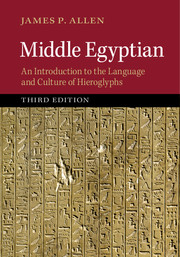Book contents
- Frontmatter
- Contents
- List of Figures
- Preface
- Lesson 1 Language and Writing
- Lesson 2 Unliteral Signs
- Lesson 3 Multiliteral Signs
- Lesson 4 Nouns
- Lesson 5 Pronouns
- Lesson 6 Adjectives
- Lesson 7 Adjectival and Nominal Sentences
- Lesson 8 Prepositions and Adverbs
- Lesson 9 Numbers
- Lesson 10 Adverbial Sentences
- Lesson 11 Non-verbal Sentences
- Lesson 12 Verbs
- Lesson 13 The Infinitival Forms
- Lesson 14 The Pseudo-verbal Construction
- Lesson 15 The Imperative and Particles
- Lesson 16 The Stative
- Lesson 17 The sdm.n.f
- Lesson 18 The sdm.f
- Lesson 19 The Other Forms of the Suffix Conjugation
- Lesson 20 Adverb Clauses
- Lesson 21 Noun Clauses
- Lesson 22 Relative Clauses
- Lesson 23 The Active Participle
- Lesson 24 The Passive Participle
- Lesson 25 Emphatic Sentences
- Lesson 26 Middle Egyptian Grammar
- Sign List
- Dictionary
- Text References
- Answers to the Exercises
- Index
Lesson 13 - The Infinitival Forms
Published online by Cambridge University Press: 05 July 2014
- Frontmatter
- Contents
- List of Figures
- Preface
- Lesson 1 Language and Writing
- Lesson 2 Unliteral Signs
- Lesson 3 Multiliteral Signs
- Lesson 4 Nouns
- Lesson 5 Pronouns
- Lesson 6 Adjectives
- Lesson 7 Adjectival and Nominal Sentences
- Lesson 8 Prepositions and Adverbs
- Lesson 9 Numbers
- Lesson 10 Adverbial Sentences
- Lesson 11 Non-verbal Sentences
- Lesson 12 Verbs
- Lesson 13 The Infinitival Forms
- Lesson 14 The Pseudo-verbal Construction
- Lesson 15 The Imperative and Particles
- Lesson 16 The Stative
- Lesson 17 The sdm.n.f
- Lesson 18 The sdm.f
- Lesson 19 The Other Forms of the Suffix Conjugation
- Lesson 20 Adverb Clauses
- Lesson 21 Noun Clauses
- Lesson 22 Relative Clauses
- Lesson 23 The Active Participle
- Lesson 24 The Passive Participle
- Lesson 25 Emphatic Sentences
- Lesson 26 Middle Egyptian Grammar
- Sign List
- Dictionary
- Text References
- Answers to the Exercises
- Index
Summary
13.1 Definitions
When they are used in actual phrases, clauses, or sentences, verbs must appear in a particular form, just as nouns must be singular, plural, or dual, and adjectives must be singular or plural and masculine or feminine. In both Egyptian and English, verb forms are of two different kinds. Most verb forms are finite: that is, they indicate an action that is limited to a particular tense, aspect, mood, or voice (or combination of these features). In the English sentence Jack was being summoned, for example, the verb form was being summoned is past (tense), imperfect (aspect), indicative (mood), and passive (voice). Middle Egyptian also has finite verb forms, as we will see in subsequent lessons.
Verb forms that describe action just as action, without being limited to a specific tense, mood, aspect, or voice, are called non-finite or infinitival. They belong to a special class of words, known as verbal nouns In English, two such forms are the infinitive (for example, to learn) and the gerund (for example, learning). English also has verbal nouns such as involvement(the action of being involved), condescension(the action of being condescending), and taxation(the action of taxing), which are made from the verb root plus different suffixes, and words such as fear, love, and hate(the actions of fearing, loving, and hating), which are made just from the verb root itself.
- Type
- Chapter
- Information
- Middle EgyptianAn Introduction to the Language and Culture of Hieroglyphs, pp. 179 - 198Publisher: Cambridge University PressPrint publication year: 2014



